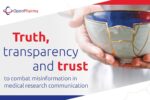This week, we learn about NIH’s AI breakthrough in gene set analysis and highlight the importance of null results in the advancement of scientific discovery. We explore ORCID’s role in the evolving research landscape and signpost Null Hypothesis’ new AI-powered tool that optimizes publication strategies for negative results. We also read about how generative AI is impacting OA infrastructure and delve into divided opinions on tackling scientific fraud. Finally, we uncover both hurdles to OA in Asia and strategies to overcome them.
To read:
NIH unveils AI agent to improve accuracy of gene set analysis via the NIH | 6-minute read
Researchers at the US National Institutes of Health (NIH) have developed an artificial intelligence (AI) agent that produces “more accurate and informative descriptions of biological processes and their functions in gene set analysis than current systems”. The AI agent, called GeneAgent, is powered by a large language model and cross-checks initial predictions against expert-curated databases for accuracy. Read more about how researchers determined GeneAgent’s effectiveness in reducing AI hallucinations.
White paper on the importance of publishing null results via Springer Nature | 20-minute read
“Null results – research findings that do not support a tested hypothesis – are a vital yet underrepresented part of the scientific record”, begins this white paper on The state of null results. Over 11 000 researchers were surveyed by Springer Nature to inform the white paper, which discusses the benefits, practices, challenges and intentions of publishing null results. Despite most respondents recognizing the value of publishing null results, they reported a gap between intention and action. The white paper concludes with a call to reform research assessment practices and recommendations to encourage the publication of null results. Springer Nature also welcomes feedback on this study through an online form.
Strengthening research integrity through ORCID integration via ORCID | 6-minute read
Paper mills, fraudulent authorship and citation manipulation pose constant threats to scholarly publishing and research integrity. In this article, authors Julie Petro (Director of Communications at ORCID) and Simon Porter (Vice President of Research Futures at Digital Science) discuss the vital role the open researcher and contributor iD (ORCID) plays in verifying identities and assessing claim credibility – cornerstones of trustworthiness per The Researcher Identity Verification Framework. The authors highlight how publishers can integrate ORCID into their workflows and invite responses to their survey about how ORCID iDs are used and collected.
Shining light on dark data via Null Hypothesis | 2-minute read
Have you got null results you want to publish, but you’re not sure how? Null Hypothesis is testing a new tool called Null Compass created to help researchers publish rigorous, surprising or unfavourable results – and they are seeking your feedback! Their privately hosted AI system analyses research using a 4-tier classification framework and provides recommendations on publication strategy including a draft abstract with strategic framing. Publishing research using the Null Hypothesis recommendations makes authors eligible to enter a microgrant programme.
How is generative AI impacting open research infrastructure? via COS | 5-minute read
In an environment where trust and transparency are paramount, services such as the Open Science Framework (OSF) that increase the availability of openly shared research are vital. This article published by the Center for Open Science (COS) describes the new challenges that journals and services like OSF face due to the emergence of fake research papers created by generative AI, and explores OSF’s active approach to promoting trustworthy science.
Survey reveals sharp divisions on tackling fraud in science via Nature | 8-minute read
A survey of data sleuths and research-integrity officers has revealed a significant disparity in how these two groups believe serious research misconduct should be handled. This preprint highlights ongoing tension between sleuths who report fraudulent research and integrity officers who investigate misconduct. Author and integrity sleuth Dorothy Bishop (Emeritus Psychologist at the University of Oxford) hopes the findings will initiate a dialogue between sleuths and integrity officers to find “the optimal system for handling research fraud”.
Licensing labyrinth: the hidden hurdles of OA in Asia via The Scholarly Kitchen | 5-minute read
While open access (OA) is growing throughout Asia, it frequently lacks a unified infrastructure or policy. The Asia OA Observatory found that fewer than 30% of indexed OA journals in South-East Asia used standard Creative Commons licences as of 2024. This post by Maryam Sayab (Director of Communications at the Asian Council of Science Editors) and Wang Linhui (Associate Professor at Fudan University Shanghai Cancer Center), published in The Scholarly Kitchen, highlights the issues surrounding OA in Asia and the lack of legal scaffolding to support it. The authors also discuss a case study based on the experience of Chinese biomedical OA journals and provide steps for a comprehensive approach to licensing clarity.
Enjoy our content? Read last week’s digest and check out our latest quarterly update!
Don’t forget to follow us on Bluesky and LinkedIn for regular updates!






